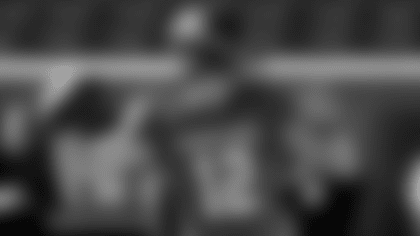The Bucs were excited about their entire free agent class last year, including former Jets FB B.J. Askew
Each year, two months before the NFL Draft, the vast majority of the players who will eventually be selected get together in one big group in Indianapolis and put their talents on display, side by side.
No such Scouting Combine exists for the other major part of the NFL's annual roster reshaping period, free agency. Forget getting all of the potential movers together in one spot; the league doesn't even choose to distribute a full list of available players until just after the market has opened. Since teams spend the last weeks leading up to free agency alternately locking potential free agents down with new deals and creating new free agents with roster-clearing maneuvers, no list would be accurate until the deadline has come and gone.
But no matter. Whereas the 300 or so players that gathered in Indianapolis are all NFL question marks to varying degrees, the players who flooded the free agent market as the clock ticked to 12:01 a.m. on Friday morning are much more known commodities. There is the same potential for boom (Jeff Garcia) or bust (Alvin Harper) of course, but overall a lot less guesswork.
That's in part due to Combines of the past, as well as years of pro-level evidence, says the man who will guide the Bucs as they wade into this year's free agent pool, General Manager Bruce Allen.
"[The planning] started with these players' Combine results four years ago that we still use as a comparison with what their height, weight, speed and agility tests were," said Allen. "It's a process of looking at all of their NFL film that we have here for the last three, four or five years, depending on if it's a restricted free agent or unrestricted free agent."
Allen and his pro personnel crew have spent months preparing for this year's open market, evaluating what may be available and how it fits the team's needs. Unlike the draft, free agency won't require the Bucs to put all of that accumulated information into action in one frenzied weekend. However, the opening days of each free agency period are usually the busiest ones across the league, and Allen's staff was at their desks, hands on their phones, when 12:01 rolled around on Friday morning.
Who will they be calling? What will they be offering? Where do they believe they need free agent help? The answers to such specific questions will be kept close to the vest, necessarily. However, shortly before the market opened, Allen sat down with Buccaneers.com for a brief Q&A session regarding the team's overall approach to free agency this year.
Below are Allen's responses on such topics as important free agent characteristics, how the team handles a player's visit and what effect the club's hard-won cap freedom will have.
**
Free Agency Q&A with General Manager Bruce Allen
The team spends an entire year preparing for each draft, and enters that weekend with a very specific strategy in place. Does the same process take place to prepare for free agency? "Oh, yes. They're not the same, because you focus on the 'best available player' in the draft but you don't take the best available free agent if you feel your team already has some depth at that position. With the young players, more than likely you'll take the highest player rated when you're drafting."
For nearly every team in the league, there are offseasons in which they seem to approach the free agent market aggressively and others in which they "lay low," perhaps due to salary cap reasons or their perceptions of the free agent pool. Do the Buccaneers go into each free agency period with an "aggressive" or "lay-low" approach, or do you go into it with an open mind to your approach and see what develops? "We always pride ourselves on being aggressive. I think there's a misconception on what 'aggressive' is throughout the league. But we have several players targeted that we see a value in that can come in and help the Buccaneers this year. Once the clock hits 12:01, as you know, we have much of our staff here and they spend the entire night in the office. Many of our phone calls are to ask a specific player about another player on his team. We have some guys targeted, but it might not be the same ones that have been reported in the newspapers."
Along those lines, last year the player that drew the most attention among your free agent signings was quarterback Jeff Garcia, and he indeed was a critical acquisition. However, there were other key players added during free agency last year. Do you think there is a general understanding of how important some of the lower-profile signings are? "We as a staff understand who we're going to target at the beginning of free agency and where we think specific players can fit into our team. The players that we call starting at 12:01 on Friday morning, they might not sign for a week to 10 days to two weeks to three weeks after that point. But we want them to know that we have an interest in them and would like to meet them to see if we can fulfill their dreams."
Do you head into the free agency period with a set budget in mind in regard to certain positions or players? "We give each player not only a football grade and a medical grade but also an economic value on that player of where he would fit into the Buccaneers pay schedule. That's basically how we operate. There's a value to our team of a particular player."
You and the team's management has worked hard over the last several years to take the team from a very difficult cap situation to a very favorable one. Now that a sizeable amount of cap room exists, is it creating the advantages you thought it would? Is it any less of an advantage since the higher cap has created more breathing room for many other teams, as well? "There's a value on it in case an opportunity knocks, and it might not be in free agency. It might be in a trade, it might occur in September, it might occur in October. But we have the ability to acquire any type of player at any time during the year, which is where we wanted to be. I think what [the larger cap and more teams having cap room] has done is there's less quality free agents available. I believe, as you've seen over the last few days, many players are re-signing with their own teams and will never get to free agency. I think it's allowed the teams to do that, so the quality of free agency isn't what it was in '02, '03, '04 when the cap was tighter on the teams."
Aside from statistics and athletic talents, what are some of the off-field characteristics you look at when bringing a player in? "Our number-one criteria is to find a good teammate. Once we learn that a player is a good teammate, the next thing we determine is how they would fit in to our team. Our definition of a teammate is the person you want to have a locker next to, the person you want in a meeting room and the person you'd like to live next door to in your neighborhood."
What method do you use to get information about a player as to what type of teammate he will be? "We have several players on our team that have friendships around the league and we can check with them to find out what type of guy the free agent is. We get that information anywhere we can get it. We started when they came out for the draft, because we have very thorough background checks on all of these players. We know where they were from high school to college. Now it's going back to retrace what's occurred during their professional career."
From the time a free agent lands at the airport in Tampa to the time he leaves, what are some of the things he does with the team? Who might he talk to and what might he see while he's here? "Almost all of them will first meet our trainer, Todd Toriscelli, and will get a physical exam. They'll meet their position coach, meet the coordinator. They'll get to talk to Coach Gruden. Eric Vance will review all of the benefits that the Tampa Bay area has to offer to them. They'll get to eat in our beautiful dining room with our five-star dining facility. I'll get to talk to them, Mark Dominik will get to talk to them, Doug Williams will get to talk to them and, depending on who it is, there could be some other people involved. We all then discuss what we thought of the person. We've already done all the work on the tape, so it's really getting to know the person and trying to make a best guess-timate out of it."
You had anticipated the team's new state-of-the-art headquarters being another major selling point for potential signees. Last year was the first offseason the team spent at its new location; did it have the impact you expected? "Without a doubt. And the people who will get to see it this year have heard about it. I know through all the Players Associations surveys that we're the best and there's a lot of intrigue about what we've built here. And coming from Indianapolis this past week, I know that anybody from the Midwest or the Northeast who is going to come on a visit right now is going to enjoy the climate here and everything that we have to offer."
Speaking of Indianapolis and the Combine, did what you see there and your previous draft preparations affect your strategy heading into free agency? "It did. Going into the Combine we were pretty sure there was some depth at a few positions in this draft and they all performed well and they all interviewed well. So I think there is some depth at a few positions which we won't identify here. But that's what's fun about the Combine. You're in a room and you get to meet for 15 minutes with a player. So you'll go through, say, all the offensive linemen the first night – you have 12 15-minute meetings in a row – and while the player is talking you're visualizing him on your team. You're thinking, 'He'll fit in here. He'll be a perfect backup and develop into a starter later on.' And the next person you see you say, 'I think he can fit in here and he can help us immediately.' You have that in your mind as you're trying to picture the entire draft and where he fits in with the other players at other positions. So, yes, it weighs heavily on our thinking for free agency."
What lessons have you learned over your years of dealing with the free agency system? "There are some good free agency signings, there are some average ones and there are some bad ones. There's never a similar situation, and that's a problem. You can't account for injuries, you can't account for some things. But we pride ourselves on trying to learn every day from what we did yesterday. From that standpoint, we're going to learn every day. We analyze every team's free agency, and we see where some mistakes were made, if you can call them mistakes. Sometimes they're not really mistakes. There's one dramatic example where someone signed [a player] who everyone thought was the best free agent at that position, and they gave him a great contract. The first day of training camp, the first play of training camp, he had a career-ending injury. Now is that a bad signing, or bad luck?"
**
For an update on the nuts and bolts of free agency and the definitions of key terms, please click here.






















